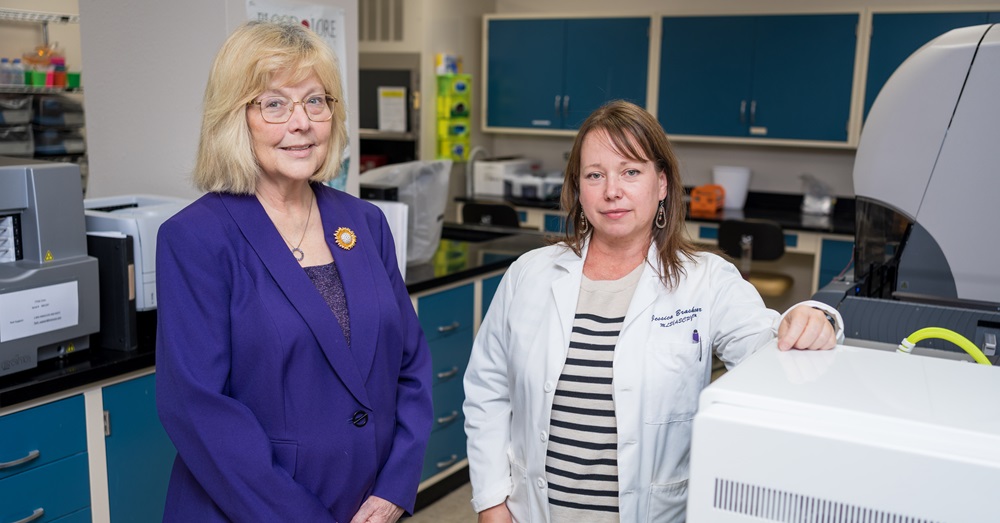Transformative, Collaborative Gift to Accelerate Research on Urinary Tract Infections

As a way to give back to the university that provided her a foundation for the career she loved, Teasdale recently made a $975,000 gift to the TTUHSC School of Nursing to support ongoing research focusing on detection and treatment of urinary tract infections (UTIs) in women. Her gift reflects a commitment to improving the quality of health care women receive. She has a personal interest in the treatment of UTIs in women, particularly women in nursing homes, where her mother was a resident during the late stages of life.
Teasdale is excited to further this area of research, and her gift supports the TTUHSC School of Nursing and School of Health Professions in adding several research assistants and post-graduate students. Student are a priority to Teasdale and are another important reason to her to make a generous gift.
The UTI research funded by Teasdale’s gift is to be conducted by a team that includes Alyce Ashcraft, Ph.D., R.N., the School of Nursing’s associate dean for research and scholarship; Donna Owen, Ph.D., R.N., professor in the School of Nursing; Jessica Brashear, assistant program director for the Clinical Laboratory Science Program at the TTUHSC School of Health Professions; and Dimitri Pappas, Ph.D., professor and chair in the Department of Chemistry and Biochemistry at Texas Tech University (TTU).
Beyond conducting a single study of UTIs, the research team is working to create a long-term program combining analytical sensing and laboratory technologies to detect UTI presence at the point-of-care. The goal is to create more accurate and timely methods of diagnosing and treating UTIs, looking first at older women and the effect of UTIs in general as it relates to an aging population.
“Ultimately, our goal is to develop point-of-care instrumentation to be able to know what's happening at the bedside so it can be detected very quickly and appropriate actions taken from that result,” Ashcraft added.

“Everyone else is looking for the pathogens in urine — What bacterium is there? That leads to a lot of false positives,” Pappas said. “We, instead, are looking at the physiological response of the individual to fighting that infection. We're looking at the activation of white blood cells in the urine, and my part of the project is developing some of the sensor technologies to hunt for those white blood cells.”
Once the white blood cells are located, Brashear will begin phase two to determine if the presence of white blood cells in the urine — which are currently viewed as a marker for UTIs — is actually normal. Brashear says the key is to find out if white blood cells are activated to fight an infection. If some cells are activated while others are not, the research team will then determine which ones are going to be responsible for fighting the UTI.
“If we can determine if the white blood cells are activated, then we can determine if there is an infection going on, which is kind of the hallmark of what we want to do,” Brashear said. “There could be some white blood cells and bacteria in there, and as soon as a provider sees that we've identified bacteria, they'll go ahead and prescribe something. We want to head that off because maybe bacteria are present, but if there are no activated white blood cells — activated is the key word — then they're not actively fighting an infection, and it's probably not something we need to treat. Phase two is going to be studying what those white blood cells look like, and how we can identify other markers that show us the white blood cells are activated and ready to fight an infection.”

“That's the real critical piece,” Owen said. “Urinary tract infections in long-term care settings are problematic for the institutions, the health care staff, including nurses and physicians, and it’s a significant challenge for patients and residents. We were so fortunate that Ms. Teasdale has given us this opportunity.”
Ashcraft and Owen plan to be active in the clinical trial process, working with patients and staff to use the instrumentation they are developing.
“The beauty of this research project is that it goes from Dr. Pappas’s lab at TTU to Dr. Brashear’s clinical lab at TTUHSC, and ultimately, the clinical setting for testing,” Ashcraft said. “It really takes that whole circle to be translational.”
Pappas agreed and said everyone in the medical field who works with older adults knows UTIs are a major problem, and many wonder if there is a relationship between UTI symptoms and dementia. That is why their research attempts to evaluate the situation from a completely different standpoint.
“If we're successful, I think we're going to change the landscape of how people look at UTIs and how they treat them,” Pappas said. “It can also change our mechanistic understanding of what causes some of these physiological and cognitive changes as well, because we’ll know what's being activated and how the body's fighting it. That will let us know how to treat the condition more effectively.”
Ashcraft said Teasdale’s remarkable gift is driving innovation with the hope to transform how UTIs are diagnosed and treated, especially for vulnerable populations like older women.
“Our research team is developing point-of-care technologies and leading collaborative clinical trials to advance precision care, reduce unnecessary antibiotic use and improve quality of life,” Ashcraft noted. “This gift creates a lasting legacy of empowering students, advancing science and building a healthier future for generations to come.”
Related Stories
National Academy of Inventors Names TTUHSC Faculty Senior Members
The National Academy of Inventors (NAI) has designated two current and one former TTUHSC faculty researchers as Senior Members.
TTUHSC Cancer Researcher Honored by National Academy of Inventors
C. Patrick Reynolds, M.D., Ph.D., director of the School of Medicine Pediatric Cancer Research Center at TTUHSC, has dedicated his life as a researcher to developing treatments for childhood cancers.
TTUHSC’s Hudson Set to Serve as President for Society of Clinical Research Associates
The Society of Clinical Research Associates (SOCRA) has elected Texas Tech University Health Sciences Center’s (TTUHSC) Catherine Hudson, Dr.P.H., as its president for 2025-2026.
Recent Stories
National Academy of Inventors Names TTUHSC Faculty Senior Members
The National Academy of Inventors (NAI) has designated two current and one former TTUHSC faculty researchers as Senior Members.
The John Wayne Cancer Foundation Surgical Oncology Fellowship Program at Texas Tech University Health Sciences Center Announced
TTUHSC is collaborating with the John Wayne Cancer Foundation and has established the Big Cure Endowment, which supports the university’s efforts to reduce cancer incidence and increase survivability of people in rural and underserved areas.
TTUHSC Receives $1 Million Gift from Amarillo National Bank to Expand and Enhance Pediatric Care in the Panhandle
TTUHSC School of Medicine leaders accepted a $1 million philanthropic gift from Amarillo National Bank on Tuesday (Feb. 10), marking a transformational investment in pediatric care for the Texas Panhandle.
